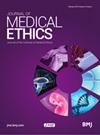值得活下去的生命,以及忽视基因偏好的非同一性限制的危险。
IF 3.4
2区 哲学
Q1 ETHICS
引用次数: 0
摘要
在这篇短文中,我详细介绍了一个反对Guido Pennings博士在《医学伦理学杂志》上的最新出版物的案例,题为“有基因相关的孩子的道德义务”。我认为,尽管潘宁斯提高了人们对生物伦理和科学重要性问题的认识,但他致命地忽视了与生殖伦理的一个核心辩论:非同一性问题(NIP)的互动。认真对待NIP,我们可以看到,潘宁斯所主张的道德义务与潘宁斯也引用的生殖慈善原则一样,受到了同样的问题的影响。如果不加批判地解读潘宁斯的观点,这种回应就会考虑到破坏性结果的可能性。本文章由计算机程序翻译,如有差异,请以英文原文为准。
Lives worth living and the danger of ignoring non-identity limits on genetic preference.
In this short paper, I detail a case against Dr Guido Pennings's latest publication in the Journal of Medical Ethics, titled 'The moral obligation to have genetically related children". I argue that Pennings, despite raising awareness of issues of bioethical and scientific import, fatally neglects to interact with a central debate in reproductive ethics: the non-identity problem (NIP). Taking the NIP seriously, we can see that the moral obligation that Pennings argues for falls victim to the same kinds of issues as the principle of procreative beneficence, which Pennings also cites. This response then considers the possibility of damaging upshots if Pennings's arguments were read uncritically.
求助全文
通过发布文献求助,成功后即可免费获取论文全文。
去求助
来源期刊

Journal of Medical Ethics
医学-医学:伦理
CiteScore
7.80
自引率
9.80%
发文量
164
审稿时长
4-8 weeks
期刊介绍:
Journal of Medical Ethics is a leading international journal that reflects the whole field of medical ethics. The journal seeks to promote ethical reflection and conduct in scientific research and medical practice. It features articles on various ethical aspects of health care relevant to health care professionals, members of clinical ethics committees, medical ethics professionals, researchers and bioscientists, policy makers and patients.
Subscribers to the Journal of Medical Ethics also receive Medical Humanities journal at no extra cost.
JME is the official journal of the Institute of Medical Ethics.
 求助内容:
求助内容: 应助结果提醒方式:
应助结果提醒方式:


